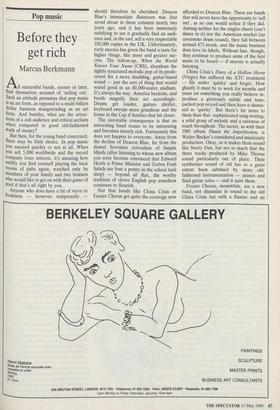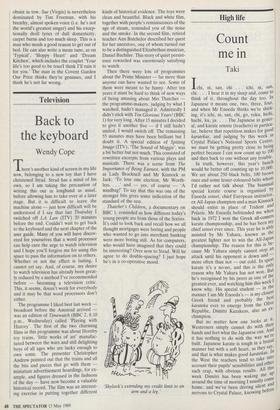Pop music
Before they get rich
Marcus Berkmann
All successful bands, sooner or later, find themselves accused of 'selling out'. Such an attitude presumes that pop music is an art form, as opposed to a multi-billion dollar business masquerading as an art form. And besides, what are the attrac- tions of a cult audience and critical acclaim when compared to good old-fashioned wads of money?
But then, for the young band concerned, there may be little choice. In pop music You succeed quickly or not at all. When you sell 5,000 worldwide and the record company loses interest, it's amazing how swiftly you find yourself playing the back rooms of pubs again, watched only by members of your family and two bruisers who would like to get on with their game of pool if that's all right by you.
Anyone who does have a bit of verve or freshness — however temporarily —
should therefore be cherished. Deacon Blue's immaculate Raintown was first raved about in these columns nearly two years ago, and it has been immensely satisfying to see it gradually find an audi- ence and, in the end, sell a very respectable 350,000 copies in the UK. Unfortunately, early success has given the band a taste for higher things, like more and greater suc- cess. The follow-up, When the World Knows Your Name (CBS), abandons the tightly structured melodic pop of its prede- cessor for a more thudding, guitar-based sound — just the sort of thing that would sound good in an 80,000-seater stadium. It's always the way. America beckons, and bands magnify their act accordingly. Drums get louder, guitars shriller, keyboard sweeps more grandiose and the house in the Cap d'Antibes that bit closer.
The inevitable consequence is that an interesting band ceases to be interesting and becomes merely rich. Fortunately this does not happen to everyone. Away from the decline of Deacon Blue, far from the dismal Seventies revivalism of Simple Minds (after listening to whose new album you soon become convinced that Edward Heath is Prime Minister and Trebor Fruit Salads are four a penny in the school tuck shop) — beyond all that, the worthy tradition of clever English pop somehow continues to flourish.
Not that bands like China Crisis or Frazier Chorus get quite the coverage now afforded to Deacon Blue. These are bands that will never have the opportunity to 'sell out', as no one would notice if they did. Aiming neither for the singles charts (can't dance to it) nor the American market (no cavernous drum sound), they fall between around 473 stools, and the music business does love its labels. Without fuss, though, they continue to produce some of the best music to be heard — if anyone is actually listening.
China Crisis's Diary of a Hollow Horse (Virgin) has suffered the XTC treatment — file under 'quirky' and forget. How ghastly it must be to work for months and years on something you really believe in, produce a gloriously subtle and tune- packed pop record and then have it dismis- sed as 'quirky'. But there's far more to them than that: sophisticated song-writing, a solid grasp of melody and a sureness of touch throughout. The secret, as with their 1985 album Flaunt the Imperfection, is Walter Becker's considered and musicianly production. Okay, so it makes them sound like Steely Dan, but not so much that the three tracks produced by Mike Thorne sound particularly out of place. Their synthesiser sound of old has to a great extent been subdued by more old- fashioned instrumentation — pianos and fluid guitar solos — and it suits them.
Frazier Chorus, meanwhile, are a new band, not dissimilar in sound to the old China Crisis but with a flautist and an oboist in tow. Sue (Virgin) is nevertheless dominated by Tim Freeman, with his breathy, almost spoken voice (i.e. he's not the world's greatest singer) and his excep- tionally droll lyrics of dull domesticity, carpet burns and too much sleep. This is a man who needs a good reason to get out of bed. He can also write a mean tune, as on 'Typical', 'Sloppy Heart' and 'Dream Kitchen', which includes the couplet 'Your life's too good to be true/I think I'll ruin it for you.' The man in the Covent Garden Our Price thinks they're geniuses, and I think he's not far wrong.



























































 Previous page
Previous page